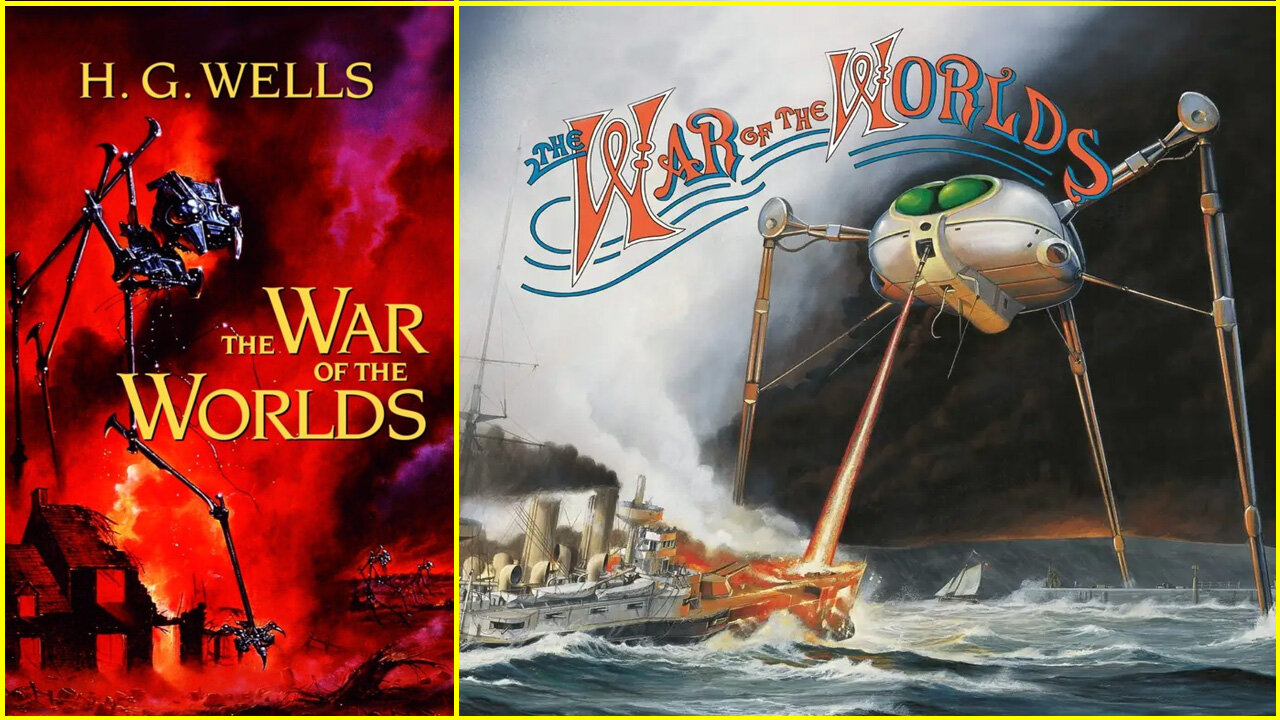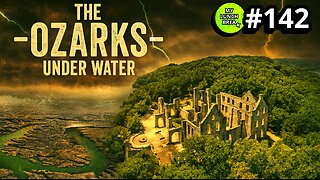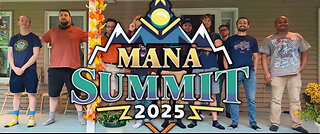Premium Only Content

'The War of the Worlds' (1898) by H G Wells
'The War of the Worlds' is a pioneering science fiction novel that tells the story of a Martian invasion of Earth and the resulting devastation. The novel is known for its vivid depictions of alien technology, its critique of imperialism, and its exploration of human resilience and vulnerability in the face of an overwhelming threat.
The story is narrated by an unnamed protagonist, a writer and philosopher living near Woking, England. It begins with astronomers observing mysterious explosions on the surface of Mars. Soon after, strange cylindrical objects crash land in the English countryside, revealing themselves to be vessels carrying the Martians—intelligent and technologically advanced beings with tentacle-like appendages.
As the first Martian craft opens, the alien invaders emerge and begin constructing giant tripod war machines, equipped with powerful heat-rays and poisonous black smoke. These machines lay waste to towns and cities, annihilating any human forces that try to resist. The British military is powerless against the Martians’ advanced weaponry, and panic spreads as the invasion progresses. The Martians are depicted as ruthless and indifferent, treating humans much like humans would treat lesser animals.
The narrator and his wife are forced to flee, becoming separated in the chaos. The story details his harrowing journey across a ravaged England, where the once-familiar landscape has become a war zone filled with fleeing refugees, destruction, and the oppressive presence of the Martians. Along the way, he encounters various characters, including a desperate artilleryman and a clergyman who becomes mentally unhinged by the crisis.
Meanwhile, the narrator’s brother in London faces his own struggle for survival, as the city is engulfed by the Martian assault. Together with two women, he escapes to the coast, where many try to flee to the Continent, believing Europe might offer safety. However, the invasion continues to spread, and no place seems safe from the Martians’ might.
The Martians begin harvesting humans for sustenance, further emphasizing the power imbalance between the invaders and their prey. The narrator struggles with his own fear and despair, hiding from the Martians while observing their alien society and technology. He learns that the Martians’ technological prowess is matched only by their lack of understanding of Earth’s ecosystem.
The turning point comes when the narrator discovers the Martians' unexpected vulnerability: they have no immunity to Earth's microorganisms. After wreaking havoc and bringing humanity to the brink of extinction, the Martians succumb to Earthly bacteria and viruses, dying suddenly and without warning. This unintentional biological warfare proves to be their downfall, allowing the survivors to reclaim their ruined world.
In the aftermath, the narrator returns to his shattered home and is eventually reunited with his wife. He reflects on the profound impact of the invasion and the realization of human frailty in the vast universe. The novel ends on a note of both relief and uncertainty, as the protagonist wonders about the future and the possibility of further encounters with life beyond Earth.
The War of the Worlds is both a gripping story of survival and a critique of colonialism, reflecting the anxieties of a society confronted with the unknown and the threat of extinction. Through the Martians' perspective, H.G. Wells challenges the notion of human superiority, suggesting that the tables could be turned just as easily. The novel's vivid imagery and themes of invasion, displacement, and resilience have made it a timeless classic, influencing countless works of science fiction and shaping the popular imagination of alien encounters.
-
 LIVE
LIVE
SpartakusLIVE
3 hours agoVerdansk Duos w/ Nicky || Saturday Spartoons - Variety Later?!
272 watching -
 LIVE
LIVE
SavageJayGatsby
1 day agoSpicy Saturday | Let's Play: Grounded
94 watching -
 13:37
13:37
Exploring With Nug
8 hours ago $1.41 earnedTrying to Uncover Secrets in St Augustine’s Waters Missing Person Search!
6.27K1 -
 LIVE
LIVE
Mally_Mouse
1 day ago🔥🍺Spicy HYDRATE Saturday!🍺🔥-- Let's Play: Grounded
99 watching -
 24:09
24:09
MYLUNCHBREAK CHANNEL PAGE
1 day agoDams Destroyed The Ozarks
60.6K30 -
 1:32:54
1:32:54
Jeff Ahern
5 hours ago $24.39 earnedThe Saturday Show with Jeff Ahern
83.3K9 -
 LIVE
LIVE
TheManaLord Plays
7 hours agoMANA SUMMIT - DAY 1 ($10,200+) | BANNED PLAYER SMASH MELEE INVITATIONAL
187 watching -
 LIVE
LIVE
Major League Fishing
2 days agoLIVE Tackle Warehouse Invitationals Championship, Day 2
107 watching -
 3:41:36
3:41:36
GamerGril
5 hours agoScream Queens 💕 Goth & Gore 💕 Unpossess
17.1K2 -
 LIVE
LIVE
CassaiyanGaming
8 hours agoMYSTIVITHON - 12 HOUR CHARITY STREAM 🌊
66 watching